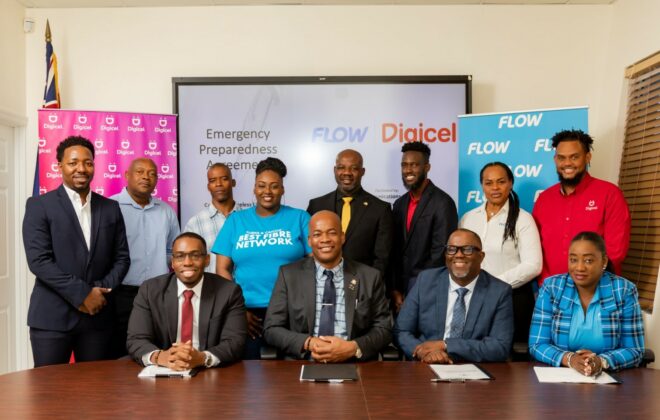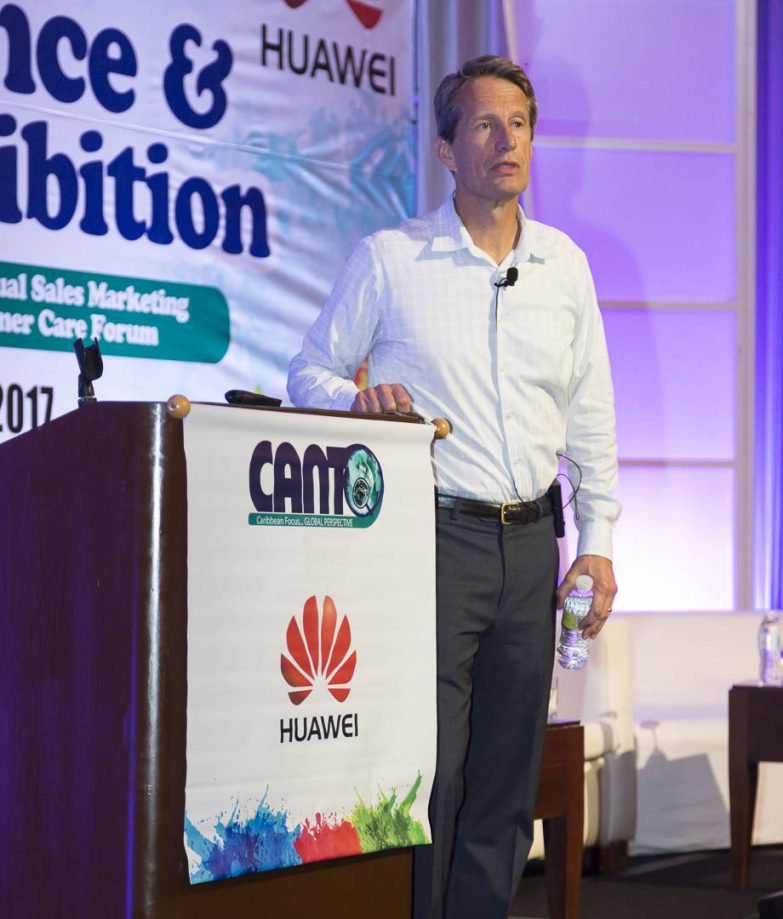CANTO Weekly Newsletter – BNamericas: 08/04/14
CWC US$250mn investment plan starts to bear fruit – Caribbean, Panama
Trinidad & Tobago telco finalizing US$236mn for organizational shakeup – Trinidad & Tobago
CWC unlikely to control Trinidad & Tobago telco before elections – Trinidad & Tobago
Struggling Hondutel cuts its losses – Honduras
LatAm currency weakness digs into Telefónica’s Q2 – Regional
CWC US$250mn investment plan starts to bear fruit – Caribbean, Panama
Cable & Wireless Communications (CWC) started to see in the first quarter of its fiscal year the positive effects of its Project Marlin investment plan to add US$250mn to its standard level capital expenditure over the next three years.
The benefits are being seen both in cost reduction and in network upgrades – and customers are already responding positively to performance improvements, CEO Phil Bentley said in a statement.
A more tangible improvement in results is expected in the second half of the year, he added, during a conference call with investors.
IMPROVED RESULTS
In an interim statement on its first fiscal quarter, ended June 30, CWC, which operates in the Caribbean as LIME, saw a 4% increase in mobile revenue compared to the end of its fiscal year on March 31 driven by a 9% rise in mobile data.
In the key Jamaica market, revenue grew 34% at constant currency, the Cayman Islands saw revenue grow 11% following the introduction of LTE, while CWC Panamá revenues grew 5% helped by increased advertising expenditure.
Total mobile subscribers were up 20%, and up 37% in Jamaica. Mobile revenue now represents 55% of total revenues.
Broadband and TV was the only disappointment: revenue grew only 3% though both areas are expected to improve following network investment.
“I’m disappointed because we have an opportunity in this category where penetration is less than 30% and we’re not getting our share of growth in an underpenetrated area. But Project Marlin is designed to improve broadband speeds and TV,” Bentley said.
Revenue from the B2B/B2G and managed services businesses was impacted by reduced government activity in Panama ahead of elections in May.
However, Bentley said that this was expected to pick up as the new government draws up its budget.
PROJECT MARLIN
Project Marlin investment will go principally into new networks and services like 4G and LTE, Wi-Fi hotspots, TV services, and B2B solutions across its operations.
The project kicked off with US$81mn of capital expenditure during the quarter, twice what the company spent in same-period last year.
As part of the project CWC has so far upgraded 126 mobile sites in Jamaica since 1 April and 4G network rollouts are expected to be completed later in the year.
Fiber build-outs were completed with over 11,000 homes passed in Cayman and 26,000 homes passed in Barbados.
In Panama the company launched direct to home (DTV) TV and “Movil Cash” products, which are already exceeding sales expectations, CWC said.
Bentley added that since CWC began tracking customer satisfaction levels in April, the net promoter score (NPS), which measures loyalty of customers to a provider, has improved by 2 percentage points across the group.
“We have begun to mobilize. We doubled year-on-year, first to first quarter, our capex spend. Obviously the faster we can get our assets into the ground we can demonstrate the benefits to customers of better speeds and more reliability,” Bentley said.
According to the executive, CWC’s cost reduction program remains on track to achieve a target of US$100mn of run-rate savings by 31 March 2015.
“We’re rationalizing our property footprint a little bit more and are starting to see energy bills come down a little bit,” he said.
“The heart of Project Marlin is network upgrades. There’s always going to be lag in the upgrades in terms of better performance on the islands and the perceived benefits by consumers and responses in terms of increased sales.”
Trinidad & Tobago telco finalizing US$236mn for organizational shakeup – Trinidad & Tobago
Trinidad & Tobago state-controlled telco TSTT is finalizing a TT$1.5bn loan (US$236mn) to boost the company’s competitiveness through the offer of new mobile and internet services, local press reported.
The Trinidad Express quoted TSTT’s acting CEO George Hill as saying the company had launched a competitive tender for the underwriting services of a bond.
“We are borrowing TT$1.5bn…for this bond through ANSA Finance and we are in the final stages of closing this. We expect by August to complete it,” Hill said.
Hill said TSTT needed to invest in its infrastructure to develop its wireless, broadband and wireless broadband services, especially for areas of the country where it was not feasible to run cable lines.
The infrastructure overhaul is needed to help TSTT compete with Digicel.
Digicel’s main Caribbean rival, Cable & Wireless Communications (CWC), holds a 49% stake in TSTT and has expressed interest in acquiring a controlling stake.
TSTT will also undergo a structural reorganization, including a voluntary separation and voluntary early retirement program. Hill said the goal is to reduce the current workforce of 2,750 by about 25%.
Hill projects that TSTT will report net income in excess of TT$100mn in the financial year ending March 31, 2015 compared to a net loss of TT$506mn for the year ended March 31, 2014.
Hill said TSTT expects to roll out LTE within the next 12 months, and that CWC may be granted its third mobile license.
CWC unlikely to control Trinidad & Tobago telco before elections – Trinidad & Tobago
The bid launched by Cable & Wireless Communications (CWC) to acquire a majority stake in Trinidad & Tobago state-controlled telco TSTT is unlikely to make any progress until after elections next year, CEO Phil Bentley said in a conference call with investors.
CWC controls 49% of TSTT and the state has 51% through its holding company National Enterprises Limited (NEL). In recent years, both parties have disagreed over the company’s direction and capital expenditure budget.
Following the release of its Q1 report, Bentley said that, even though the government is cooperating, issues with the workers union and general elections scheduled for May 2015 means a deal won’t happen before that date.
Trinidad & Tobago is one of 15 regional markets where CWC has a partnership with the state.
In 2011, CWC acquired a 51% stake in the Bahamas Telecommunications Company (BTC), only to see a new administration come in and begin a campaign to recover control of the company. As a compromise CWC agreed to transfer a 2% economic interest to a charitable organization.
In Panama, CWC and the government have equal 49% shares in CWC Panama.
Struggling Hondutel cuts its losses – Honduras
State telco Hondutel’s net loss declined 56% in the first half of the year.
The Honduran firm reported 134mn lempiras (US$6.42mn) in losses in H1 compared to 303mn lempiras in 1H13 losses.
While operating income and the cost of services both increased slightly this year, the biggest changes occurred in operating expenses, which Hondutel reduced to 692mn lempiras from 845mn lempiras.
The struggling firm is on the verge of collapse amid reports claiming corruption, financial mismanagement and an excessively large workforce.
In an effort to reduce costs, the telco cut its management positions by more than half, to 106 from 238, while 716 employees were laid off or resigned in Q1.
Last week, officials from Costa Rican state telco ICE reportedly said they were interested in investing in Hondutel and becoming its strategic partner.
It is estimated the company needs to invest US$500mn-600mn to put it on a competitive footing with Claro and Tigo.
LatAm currency weakness digs into Telefónica’s Q2 – Regional
Currency weakness in Latin America continued to have a strong impact on Telefónica’s revenue, which fell 11.8% to 12.7bn euros (US$17bn) in the second quarter.
The Spanish firm reported a 4.9% net income increase to 1.21bn euros.
The operator’s revenues fell 11% in Brazil and 14.6% in Spanish Latin America in euro terms, as currency weakness in the region showed no sign of letting up in Q2.
On a constant currency basis, Telefónica would have seen a revenue increase of 1.3% driven largely by an 11.3% income growth in Spanish Latin America and a 1% increase in Brazil in local currency terms.
A key growth area for the company, Latin America eclipsed lower revenues in European markets in Q2, CFO Ángel Vilá said in a conference call with investors.
Telefónica continues to see strong organic growth in the region on the back of mobile data expansion, while broadband and pay TV services also expanded in Spanish Latin America.
The operator remains on track to turn around its fixed-line business in Brazil, Vilá added, with net ads for fixed telephony, broadband and pay TV reaching 156,000 in the country in Q2.
The company’s net debt increased 1.07bn euros to 43.8bn euros at end-June, driven mainly by the payment of a 0.40 euros per share cash dividend in May, its release said.
The sale of Telefónica’s Irish division, completed in July, took net debt to 43bn, in line with the company’s target of reducing net debt to 43bn euros by end-year.
The information presented and opinions expressed herein are those of the author and do not necessarily represent the views of CANTO and/or its members



